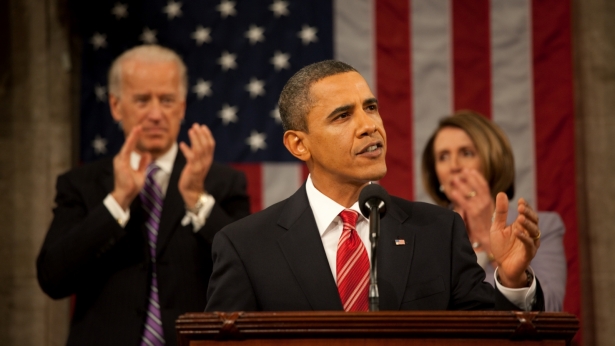I’m never sure how to write these reaction pieces to the State of the Union. I’m far past the point when my reactions bear any relation to Normal People’s. By all indications, Normal People loved Obama’s speech — instapolls showed positive reactions. Reviews from the punditocracy seem generally positive as well. Hell, Chris Matthews forgot he was black! So I suppose on objective grounds, you’d have to call the speech a resounding success.
That said, I thought it was weak — good for Obama, maybe, but not good for progressive governance. Over and over he adopted bankrupt conservative frames and policies, from hype about tax cuts and tax credits to spending freezes, deficit commissions, and PAYGO. He even analogized the federal budget to a family budget, a false and utterly toxic comparison that encourages the public’s lamentable ignorance on fiscal policy. (In a downturn, the feds should spend more, not less!) If the bully pulpit is useful for anything, it’s for speaking to the American people the way you want to speak, not in the pinched, circumscribed language acceptable to the DC Village.
Conservative energy
The capitulation to conservative narratives was particularly glaring on the subjects of climate and energy. He began well, introducing the eminently sensible notion that the U.S. needs to get cracking on creating clean energy jobs lest we have our lunch eaten by China, Germany, and India. “I do not accept second place for the United States of America,” he thundered.
Well good then! What does that mean? This was the opportunity. There are thousands of stories he could have told: about the burgeoning interest in energy efficiency and building retrofits, the cheapest and most labor-intensive way to reduce emissions; the astoundingly fast spread of distributed energy, driven by innovative financing models; the rapid growth and falling costs of wind and solar thermal power; the spread of bright green, low-carbon, walkable cities, where people benefit by living more sustainable lives. There are so many fascinating, inspiring, untold stories around energy right now. This was a real chance to open the public’s eyes to the amazing revolution happening around them — a revolution that can benefit them, employ them, and inspire them.
Instead “what it means” was, in order: nukes, offshore oil and gas drilling, biofuels, “clean coal,” and … well, that’s it. That’s right, in listing what “clean energy” means the president did not mention renewable energy. That’s just stunning. It’s 2010 and renewable energy isn’t even an afterthought? Seriously?
I suppose it was done to flatter conservative Senators that will have to vote for the bill Kerry, Lieberman, and Graham are working on. But the SOTU is not a policy negotiation. It’s a bully pulpit, a chance to shape rather than respond to existing narratives. Kerry says he needs the grassroots to get angry, get excited, get active:
“I want you to go out there and start knocking on doors and telling people this has to happen,” Kerry said during a conference hosted by labor, farming, military veteran and environmental groups. “You know if the Tea Party folks can go out there and get angry because they think their taxes are too high, for God’s sake, a lot of citizens ought to get angry about the fact that they’re being killed and our planet is being injured by what’s happening on a daily basis by the way we provide our power and our fuel and the old practices we have. That’s something worth getting angry about.”
Well, what’s going to fire up the grassroots? It ain’t nukes and coal. MoveOn had its members providing continuous dial feedback during the speech and the single biggest dip in approval came during the nukes ‘n’ oil section (around 9:35). This stuff insults and demoralizes the very people Kerry wants to fire up. And for what? It’s horrible substance and horrible politics.
Short shrift for caulkers
The infrastructure stuff was great, particularly the call-out for high-speed rail (which he’ll talk about more in Tampa tomorrow). But that’s all one-off stimulus money being spent. At no point did Obama say that the country needs large and sustained level of infrastructure investment — it was just about creating a few jobs to get through this downturn.
And remember how the program to retrofit residential buildings — so-called Cash for Caulkers — was going to be a major plank in Obama’s jobs program? Here’s what he said about it:
We should put more Americans to work building clean energy facilities — and give rebates to Americans who make their homes more energy-efficient, which supports clean energy jobs.
That’s it. Could it be any more bloodless and cursory, more like an item on a checklist? I don’t even know WTF “clean energy facilities” are.
The bright side
Lest you be overwhelmed by my cynicism (which is at unusually high levels lately), there were a few bright moments. First, the focus on clean energy jobs and 21st century competition is good, even if filled it out with 19th century energy sources that don’t actually create many jobs. It’s good that Obama is opening up an ideological space for non-greens to get excited about clean energy: “the nation that leads the clean energy economy will be the nation that leads the global economy. And America must be that nation.” Perfect line.
It’s great, of course, that he called on Congress to pass a comprehensive climate/energy bill. (One of what seemed about a half-dozen times when he said, “The House has acted, now the Senate needs to. A-freaking-hem!”) It would have been nice, though, if he’d at least gestured at what a good bill would look like. Here’s what he said about financial reform: “if the bill that ends up on my desk does not meet the test of real reform, I will send it back until we get it right.” That’s called a veto threat, and it’s something a president does when he’s serious about the substance of a policy. He could equally have said, “if a climate bill reaches my desk that does not contain a cap on carbon pollution, I will send it back.” But he didn’t even mention the cap, aside from the oblique use of “comprehensive.” He gave the Senate basically no direction and no bottom lines. The message was: “Just pass something.”
Oh, wait, I was being positive.
It’s telling that the speech really caught fire toward the end, when he left behind substance and started talking process. I loved that he called out Republicans: “Neither party should delay or obstruct every single bill just because they can.” I loved that he called out Democrats: “we still have the largest majority in decades, and the people expect us to solve problems, not run for the hills.”
I love the rhetoric of leadership, of seizing history, of tackling big problems and accomplishing big things. I love the idea of it. It has kept me going through a grinding year in energy politics, in which greens have had to eat one sh*t sandwich after another. The idea still gives me the stomach butterflies when I let it.
But man can not live on ideas alone, and Obama can not lead on vague uplift alone. Sooner or later the abstract ambition has to translate to serious, sustained commitment to bold and specific policies. He’s got to put some cards on the table, get in the mix, risk losing a little bit of his cool and composure. Otherwise he runs the danger of having his legacy be little more than vast and unrealized hopes.



